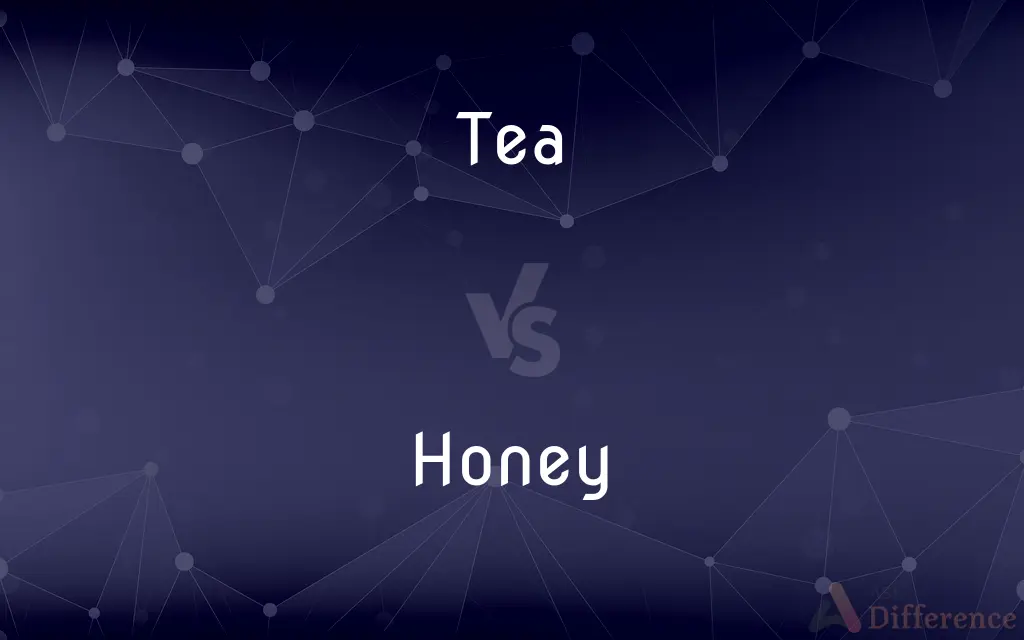Tea vs. Honey — What's the Difference?
By Maham Liaqat & Fiza Rafique — Updated on April 6, 2024
Tea is a beverage made by infusing dried leaves in hot water, known for its variety and caffeine content, whereas honey is a sweet, viscous food substance produced by bees, prized for its natural sweetness and health benefits.

Difference Between Tea and Honey
Table of Contents
ADVERTISEMENT
Key Differences
Tea is a popular beverage derived from the Camellia sinensis plant, enjoyed for its flavor, caffeine content, and antioxidant properties. It can be prepared in various forms, including black, green, and oolong, each offering a distinct taste and aroma. Whereas honey is a natural sweetener produced by bees from the nectar of flowers. It is appreciated for its rich, sweet taste and its versatility in both culinary and medicinal applications. Honey is known for its antibacterial and anti-inflammatory properties, making it a beneficial addition to tea and other foods.
While tea contains caffeine, which can provide a temporary boost in alertness and energy, honey contains natural sugars and trace amounts of vitamins and minerals. Tea drinkers might seek the stimulating effect of caffeine, whereas those consuming honey may benefit from its nutritional content and natural energy boost without the caffeine.
Tea can be consumed hot or cold, and its flavor can be altered with the addition of milk, lemon, or herbs. This versatility makes it a beverage of choice for many around the world, fitting into various cultural rituals and preferences. On the other hand, honey is often used as a sweetener in beverages like tea and coffee, as well as in baking and cooking, highlighting its role as a versatile culinary ingredient.
The cultivation and production of tea involve the planting, growing, and processing of the tea plant, which can be labor-intensive and requires specific climatic conditions. Conversely, honey production depends on the activity of bees pollinating flowers and collecting nectar, which is then transformed into honey within the beehive. Both processes are influenced by environmental factors, but they rely on distinctly different methods and organisms.
Regarding health benefits, tea is often celebrated for its potential to reduce the risk of chronic diseases such as heart disease and diabetes, thanks to its antioxidants. Honey, in contrast, is recognized for its wound-healing properties and ability to soothe coughs and sore throats, offering a natural remedy for common ailments.
ADVERTISEMENT
Comparison Chart
Source
Camellia sinensis plant
Nectar collected by bees
Main Components
Water, caffeine, antioxidants
Sugars (mainly fructose and glucose), trace minerals
Usage
Beverage, can be served hot or cold
Sweetener, medicinal uses
Health Benefits
Antioxidant properties, may reduce risk of chronic diseases
Antibacterial, anti-inflammatory, wound healing
Preparation
Infused in hot water
Produced by bees, extracted from hives
Compare with Definitions
Tea
Holds significant cultural importance in many countries.
In Japan, the tea ceremony is a revered art form and a spiritual practice.
Honey
A sweet, viscous food substance made by bees using nectar from flowers.
She drizzled honey over her pancakes for extra sweetness.
Tea
Rich in antioxidants and has been linked to numerous health benefits.
Drinking green tea regularly is associated with a lower risk of heart disease.
Honey
Exists in various forms, such as raw, pasteurized, and comb honey.
Raw honey is preferred for its minimal processing and nutritional value.
Tea
Contains varying levels of caffeine, depending on the type.
Black tea has a higher caffeine content than white tea.
Honey
Used in various cultural rituals and traditions.
Honey is often given as a gift during the Rosh Hashanah Jewish New Year celebration for a sweet year ahead.
Tea
Comes in several varieties, including black, green, oolong, and herbal.
He prefers oolong tea for its balanced flavor and aroma.
Honey
Serves as a natural alternative to processed sugars.
He uses honey to sweeten his tea instead of sugar for a healthier option.
Tea
A brewed drink prepared from the cured leaves of the Camellia sinensis plant.
She starts her morning with a warm cup of green tea for a gentle caffeine kick.
Honey
Known for its antibacterial and anti-inflammatory properties.
Applying honey on wounds can help in faster healing.
Tea
Tea is an aromatic beverage prepared by pouring hot or boiling water over cured or fresh leaves of Camellia sinensis, an evergreen shrub native to China and East Asia. After water, it is the most widely consumed drink in the world.
Honey
Honey is a sweet, viscous food substance made by honey bees and some related insects, such as stingless bees. Bees produce honey from the sugary secretions of plants (floral nectar) or from secretions of other insects (such as honeydew), by regurgitation, enzymatic activity, and water evaporation.
Tea
A hot drink made by infusing the dried crushed leaves of the tea plant in boiling water
Katherine sipped her tea
Honey
A sweet, sticky yellowish-brown fluid made by bees and other insects from nectar collected from flowers.
Tea
The evergreen shrub or small tree which produces tea leaves, native to southern and eastern Asia and grown as a major cash crop.
Honey
An excellent example of something
It's one honey of an adaptation
Tea
A light afternoon meal consisting typically of tea to drink, sandwiches, and cakes
Picnic teas
They were about to take afternoon tea
Honey
A sweet yellowish or brownish viscid fluid produced by various bees from the nectar of flowers and used as food.
Tea
Drink tea or take afternoon tea
I teaed with Professor Herron
Honey
A similar substance made by certain other insects.
Tea
An evergreen shrub or small tree (Camellia sinensis) native to Asia, having fragrant, nodding, cup-shaped white flowers and glossy leaves.
Honey
A sweet substance, such as nectar or syrup.
Tea
The young, dried leaves of this plant, prepared by various processes and used to make a beverage, usually served hot.
Honey
Sweetness; pleasantness
"The first few years could not have been all honey" (Nadine Gordimer).
Tea
An aromatic, slightly bitter beverage made by steeping tea leaves in boiling water.
Honey
(Informal) Sweetheart; dear. Used as a term of endearment.
Tea
Any of various plants, such as New Jersey tea, having leaves that are or were formerly used to make a tealike beverage.
Honey
(Informal) Something remarkably fine
A honey of a car.
Tea
Any of various beverages made by steeping the leaves, flowers, fruits, or other parts of certain plants
Herbal tea.
Peppermint tea.
Honey
To sweeten with honey; add honey to.
Tea
Any of various beverages made by extracting an infusion from meat, especially beef.
Honey
To make pleasant or appealing
His words were honeyed as he spoke.
Tea
A tea rose.
Honey
To give a yellow or golden color to.
Tea
An afternoon refreshment consisting usually of sandwiches and cakes served with tea.
Honey
(uncountable) A viscous, sweet fluid produced from plant nectar by bees. Often used to sweeten tea or to spread on baked goods.
The honey in the pot should last for years.
Tea
High tea.
Honey
(countable) A variety of this substance.
Tea
An afternoon reception or social gathering at which tea is served.
Honey
(rare) Nectar.
Tea
(Slang) Marijuana.
Honey
(figuratively) Something sweet or desirable.
Tea
(uncountable) The tea plant (Camellia sinensis); (countable) a variety of this plant.
Darjeeling tea is grown in India.
Honey
A term of affection.
Honey, would you take out the trash?
Honey, I'm home.
Tea
(uncountable) The dried leaves or buds of the tea plant; (countable) a variety of such leaves.
Go to the supermarket and buy some Darjeeling tea.
Not for all the tea in China.
Honey
A woman, especially an attractive one.
Man, there are some fine honeys here tonight!
Tea
(uncountable) The drink made by infusing these dried leaves or buds in hot water.
Would you like some tea?
Honey
A spectrum of pale yellow to brownish-yellow colour, like that of most types of (the sweet substance) honey.
Tea
(uncountable) Any similar drink made by infusing parts of various other plants.
Camomile tea; mint tea
Honey
Involving or resembling honey.
Tea
Meat stock served as a hot drink.
Beef tea
Honey
Of a pale yellow to brownish-yellow colour, like most types of honey.
Tea
A cup or glass of any of these drinks, often with milk, sugar, lemon, and/or tapioca pearls.
Honey
(transitive) To sweeten; to make agreeable.
Tea
A light midafternoon meal, typically but not necessarily including tea.
Honey
(transitive) To add honey to.
Tea
Syn of supper, the main evening meal, whether or not it includes tea.
The family were sitting round the table, eating their tea.
Honey
(intransitive) To be gentle, agreeable, or coaxing; to talk fondly; to use endearments.
Tea
(cricket) The break in play between the second and third sessions.
Australia were 490 for 7 at tea on the second day.
Honey
(intransitive) To be or become obsequiously courteous or complimentary; to fawn.
Tea
Syn of marijuana.
Honey
A sweet viscid fluid, esp. that collected by bees from flowers of plants, and deposited in the cells of the honeycomb.
Tea
Information, especially gossip.
Spill the tea on that drama, hon.
Honey
That which is sweet or pleasant, like honey.
The honey of his language.
Tea
A moment, a historical unit of time from China, about the amount of time needed to quickly drink a traditional cup of tea. It is now found in Chinese-language historical fiction.
Honey
Sweet one; - a term of endearment.
Honey, you shall be well desired in Cyprus.
Tea
To drink tea.
Honey
To be gentle, agreeable, or coaxing; to talk fondly; to use endearments; also, to be or become obsequiously courteous or complimentary; to fawn.
Rough to common men,But honey at the whisper of a lord.
Tea
To take afternoon tea (the light meal).
Honey
To make agreeable; to cover or sweeten with, or as with, honey.
Canst thou not honey me with fluent speech?
Tea
To give tea.
Honey
A sweet yellow liquid produced by bees
Tea
The prepared leaves of a shrub, or small tree (Thea Chinensis or Camellia Chinensis). The shrub is a native of China, but has been introduced to some extent into some other countries.
Honey
A beloved person; used as terms of endearment
Tea
A decoction or infusion of tea leaves in boiling water; as, tea is a common beverage.
Honey
Sweeten with honey
Tea
Any infusion or decoction, especially when made of the dried leaves of plants; as, sage tea; chamomile tea; catnip tea.
Honey
Having the color of honey
Tea
The evening meal, at which tea is usually served; supper.
Tea
To take or drink tea.
Tea
A beverage made by steeping tea leaves in water;
Iced tea is a cooling drink
Tea
A light midafternoon meal of tea and sandwiches or cakes;
An Englishman would interrupt a war to have his afternoon tea
Tea
Dried leaves of the tea shrub; used to make tea;
The store shelves held many different kinds of tea
They threw the tea into Boston harbor
Tea
A reception or party at which tea is served;
We met at the Dean's tea for newcomers
Tea
A tropical evergreen shrub or small tree extensively cultivated in e.g. China and Japan and India; source of tea leaves;
Tea has fragrant white flowers
Common Curiosities
Can honey be added to tea?
Yes, honey can be added to tea as a natural sweetener, enhancing its flavor and providing additional health benefits.
Does tea contain caffeine?
Yes, most tea contains caffeine, the amount of which varies depending on the type of tea.
What is tea?
Tea is a beverage made by infusing dried leaves of the Camellia sinensis plant in hot water, known for its variety and caffeine content.
How is honey produced?
Honey is produced by bees from the nectar of flowers, which they collect, transform, and store in honeycombs within their hives.
What is honey?
Honey is a natural sweet substance produced by bees from the nectar of flowers, appreciated for its sweetness and health benefits.
Is honey healthier than sugar?
Honey is considered healthier than processed sugar due to its natural origins and the presence of trace nutrients and antioxidants.
Can tea help in weight loss?
Certain types of tea, especially green tea, may aid in weight loss due to their metabolism-boosting properties.
What are the health benefits of honey?
Honey has antibacterial, anti-inflammatory, and wound-healing properties, making it beneficial for both dietary and medicinal uses.
Can drinking tea improve skin health?
Yes, the antioxidants in tea, especially green tea, can help improve skin health by reducing inflammation and signs of aging.
What are the health benefits of tea?
Tea offers various health benefits, including antioxidant properties and potential reduction in the risk of chronic diseases.
Is all honey the same?
No, there are various types of honey, differing in flavor, color, and nutritional content based on the nectar source.
How should tea be stored to maintain its freshness?
Tea should be stored in airtight containers away from light, moisture, and strong odors to maintain its freshness.
What makes honey unique compared to other sweeteners?
Honey's uniqueness lies in its natural composition, health benefits, and the process of its production by bees.
How many types of tea are there?
There are several main types of tea, including black, green, oolong, and white, each with distinct processing methods and flavors.
Share Your Discovery

Previous Comparison
Farm vs. Field
Next Comparison
Stirrer vs. AgitatorAuthor Spotlight
Written by
Maham LiaqatCo-written by
Fiza RafiqueFiza Rafique is a skilled content writer at AskDifference.com, where she meticulously refines and enhances written pieces. Drawing from her vast editorial expertise, Fiza ensures clarity, accuracy, and precision in every article. Passionate about language, she continually seeks to elevate the quality of content for readers worldwide.
















































